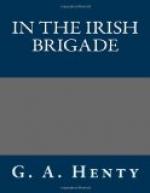A desperate fight now took place. On both flanks, the ground was broken by enclosures with deep wet ditches, bridges, woods, and small villages; and the cavalry were unable to act on such ground. The infantry on both sides fought with extreme resolution; every hedge, ditch, bridge, and house being defended to the last. Seldom, indeed, in modern warfare, has so obstinate and terrible a fight taken place. Frequently the combatants were mingled together, and fought with bayonets and the butt ends of their muskets.
Gradually, however, the Dutch and the Hanoverian battalions won their way forward, and drove the French back to the village of Diepenbeck, where the latter successfully maintained themselves. Marlborough then ordered General Overkirk to move round and seize the hill at Oycke, which, although it flanked the enemy’s position, was not held by them.
This he did, with twenty Dutch and Danish battalions, who had only just crossed the river. He then pressed on and seized the mill of Royegham, thus cutting the communication between the French at Diepenbeck and the troops that still remained on the plateau beyond the Norken. Eugene then swung round his right, and, pressing forward, surrounded the French on that side, so completely enveloping them that his men and those of Overkirk each believed the other to be French—for darkness had now fallen—and fought for some time before the mistake was discovered.
As, in such a country, it was impossible to move troops in regular formation in the darkness, Marlborough gave orders for the troops to halt in the positions they held. Had the light lasted two hours longer, the whole of the French army would have been slain or captured; but, under cover of darkness, the greater portion made their way through the intervals of the allied troops. Many fled to Ghent, while thousands made for the French frontier. Vendome lost in killed and wounded six thousand men, and nine thousand prisoners, and his total loss exceeded twenty thousand; while the allies lost five thousand, of whom the great majority were Dutch, Danes, and Germans.
The French troops on the plateau withdrew, under the direction of Vendome, in good order; and before morning a large number of fugitives had rallied. Marlborough sent forty squadrons of horse in pursuit of them, but the French showed so firm an attitude that the cavalry were unable to seriously interfere with their retreat. Berwick had remained, during the day, near the marshal; and had placed his aides-de-camp at his disposal, for the difficulty of the ground, and the distance from the plateau of the various points at which the troops were engaged, rendered communication much slower than it otherwise would have been, and Desmond and his companions were frequently sent off with orders.
It was the first time Desmond had been under fire, and the effect of the roar of musketry, the whizzing of bullets, and the shouts of the combatants, gave him a much stronger feeling of discomfort than he had expected. The roar of cannon was not added to the other sounds, for the guns of the day were clumsy and difficult to move; and, owing to the rapid marches and countermarches of both armies, the greater portion of the artillery had been left behind, and only a few guns were on the field, and these, in so close and confined a country, were of little use.




